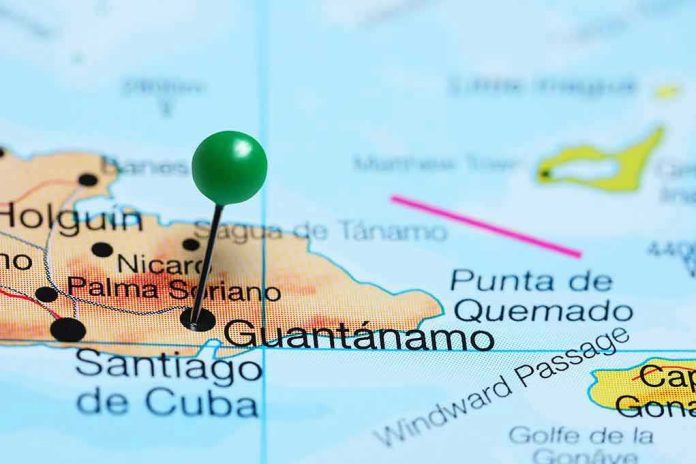
While Cuba’s communist regime tightens its iron grip and jails dissenters, the Trump administration finally sanctioned President Díaz-Canel for human rights abuses, though one has to wonder if it’s too little, too late.
At a Glance
- The U.S. government has sanctioned Cuban President Miguel Díaz-Canel and top officials for systematic human rights violations.
- July 11, 2021, marked the largest Cuban anti-government protests in decades, met with brutal repression and mass arrests.
- Cuba’s Communist Party blames “foreign interference” while clinging to power, crushing dissent, and ignoring the suffering of its own people.
- Sanctions highlight the international community’s outrage but do little to relieve Cuba’s ongoing economic misery and political oppression.
U.S. Targets Cuban Regime for Crushing Dissent
On the anniversary of the July 11, 2021, mass protests in Cuba—those rare days when ordinary Cubans dared to demand freedom in the streets—the U.S. government announced new sanctions against President Miguel Díaz-Canel and his henchmen. The move is a response to the regime’s brutal crackdown: hundreds jailed, internet blackouts enforced, and any whiff of dissent stomped out by the ever-vigilant communist security forces. America’s message, at least in theory, is clear: we won’t turn a blind eye while Havana’s overlords silence their own people and lock up anyone who dreams of liberty.
But as the administration touts its tough talk, it’s impossible not to notice the timing—sanctions coming years after the regime’s thugs first flooded the streets to drag off peaceful protesters. The world watched as the Cuban government blamed “foreign agitation” (read: the United States) for unrest, while the real roots—rampant inflation, food and medicine shortages, and blackouts—were homegrown and decades in the making. The Communist Party, now led by Díaz-Canel instead of a Castro, hasn’t missed a beat in keeping the island’s political system locked in the 1950s, where free speech and family values are as rare as a steak dinner in Havana.
The Regime’s Playbook: Repression, Denial, and Blame
July 2021’s protests marked a tipping point in Cuba’s post-Castro era. Spontaneous crowds from all walks of life—youth, artists, tired parents—marched under the sun, chanting “Libertad!” and “Down with the dictatorship!” The regime’s response was as predictable as it was ruthless: police crackdowns, mass arrests, and a swift blackout of social media and internet access to keep the world in the dark. International human rights groups, from Amnesty International to Human Rights Watch, meticulously documented the abuses, but the regime doubled down, painting itself as the innocent victim of Yankee plots.
For the ruling Communist Party, the goal remains unchanged: preserve power at all costs, even if it means keeping an entire nation in poverty and fear. The government’s narrative—blaming foreign “interference” and labeling protesters as mercenaries—rings increasingly hollow as the average Cuban struggles to secure basic necessities. The economic crisis, exacerbated by failed policies, COVID-19, and the collapse of Venezuela’s oil largesse, is now compounded by sanctions that, while morally justified, do little to loosen the regime’s chokehold or fill empty store shelves.
Sanctions: Symbolic Gesture or Real Consequence?
The Trump administration’s sanctions on Díaz-Canel and his cronies are a symbolic slap on the wrist—a visa ban here, a financial freeze there—meant to send a message that the U.S. stands with the Cuban people. But after sixty-five years of communist rule and generations of empty promises, Cubans know better than to expect salvation from Washington. Most remain trapped between a regime that jails and exiles its critics and an international community whose outrage rarely translates into meaningful change.
Meanwhile, the Cuban diaspora, ever-resourceful and resilient, continues its activism from afar, shining a light on the regime’s abuses and keeping the flame of Cuban liberty alive. Yet those left behind face daily intimidation, with many activists languishing in prison or forced into exile. The government’s grip may be slipping at the edges, its legitimacy eroded by decades of mismanagement and repression, but for now, it remains as immovable as ever—propped up by fear, propaganda, and a ruthless security apparatus.
When Will Common Sense—And Freedom—Prevail?
The real tragedy isn’t just the suffering of the Cuban people, but the maddening spectacle of a regime that would rather blame the world than fix its own failures. Economic hardship grinds on, families are torn apart by exile and imprisonment, and any hope for reforms is snuffed out before it can take root. The U.S. sanctions, though well-intentioned, are just another chapter in a long saga of international outrage that does little to bring real relief to the island’s weary citizens.
For those of us watching from the sidelines, the lesson is both simple and infuriating: freedom is worth fighting for, and the only thing standing between Cubans and a better future is a regime terrified of its own people. Until the world—America included—finds the courage to back up words with real action, the Cuban people will keep waiting for the day when common sense, not communist dogma, finally calls the shots in Havana.














